It’s tough to on a road trip, camping or working around the house without extra electricity. All our devices depend on it.
Who hasn’t used an extra power bank travelling or a long day out of the house to charge our phone.
EcoFlow, a company started in 2017 using expertise from drone batteries, makes large portable batteries for emergency use around the house, or portable use at the campsite or cabin.
Recently EcoFlow released the Delta Mini, a smaller version of their popular, and powerful, Delta power stations.
What is the Delta Mini power station?
The Delta Mini is the smallest and most portable power station in the Delta line still packing 882 watt-hours of power. On the other side, the largest station in the River line is the River Pro with 720 watt-hours.
The shape of the Delta line is more rectangular with the ports on the end compared to all the ports on the front of most power stations. This configuration actually works very well with the battery behind the seats of cars. It’s difficult to plug anything into the front when it’s shoved up against a car seat, but with the ports on either end like the Delta, they are all accessible.
The Mini really packs a punch for a small battery with charging quickly and powering high-wattage devices. The X-Boost and X-Stream features really make this battery seem much larger than it actually is. Check out the Output and Charging sections for more info.
What can you use the Delta Mini for?
You can use the Delta Mini to power just about anything you can plug in. It easily powers cameras, drones, laptops, and phones. We’ll get into more specs down below, but with the 1400 watt output (1800 watts with X-Boost on) it can power small hair dryers and heaters, power tools, overland fridges and computers. It could even power a 400 watt air conditioner for 2 hours.
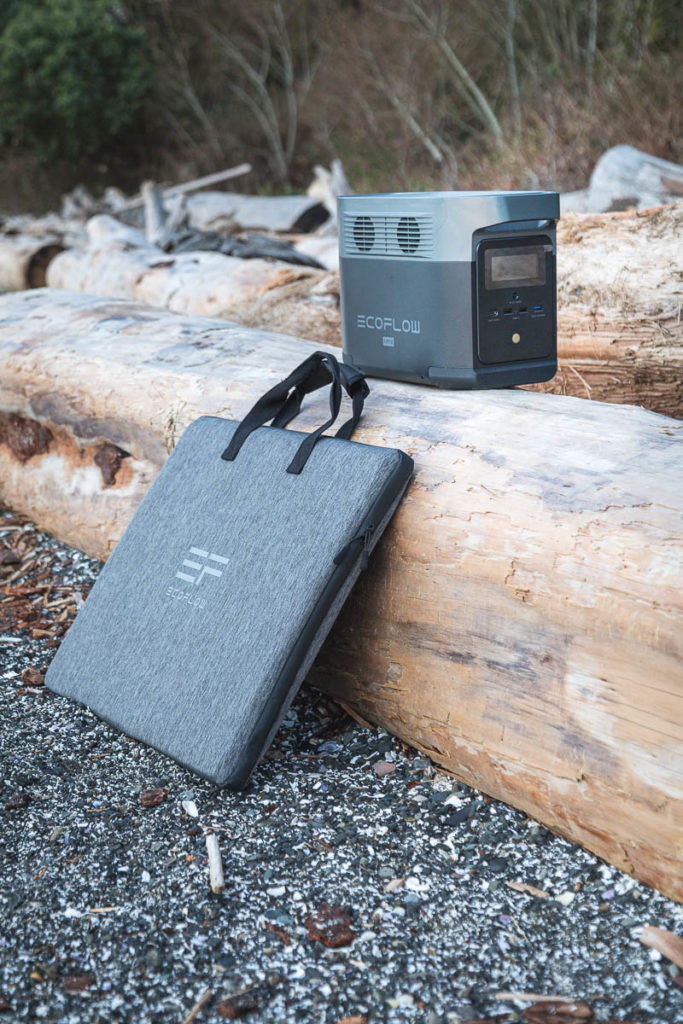
Ok, let’s get into the details. What’s in this review?
- Specs
- What’s in the box
- Outputs
- Screen
- Charging
- App
- Alternatives
- Conclusion
Specs
- 882 Wh capacity
- 24 pounds
- 1400W output
- 1800W output with X-Boost on
- NCM Li-ion battery
- $1299 CAD
What’s in the box?
A few things come in the box:
- Delta Mini Power Station
- DC 5521 to 5525 cable
- MC4 cable solar charging cable
- AC charging cable
- Car charging cable
I like that it comes with the car charger. Many power stations don’t and it’s something that you have to buy separate.
Case and Outputs
The case is longer and narrower than most power stations with the handles on the sides. I prefer the center handles for one-hand carries but picking up with the end handles is easy and it’s not bad to carry around at 24 pounds.
The flat surface on the top is like a plate and is a great place to hold phones or drones as they charge.
The rectangular shape fits well behind the seats of cars. You still have access to either end to plug things in but it doesn’t take up as much space as a more square power station.
Output Ports
For outputs, there are 12 total with the AC, USB and DC.
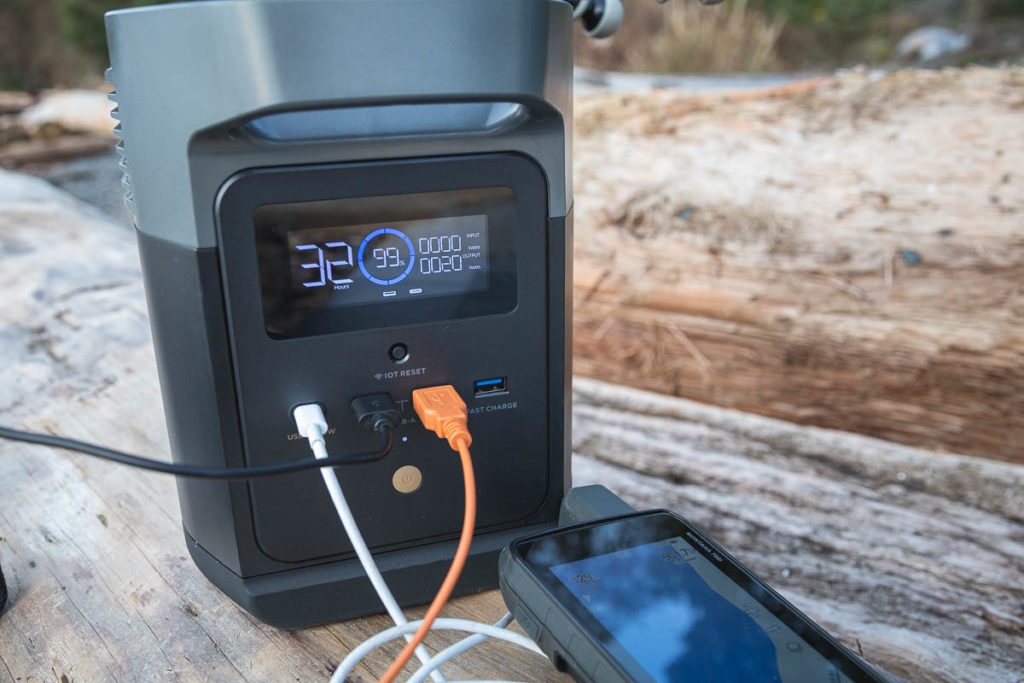
The output ports are:
- 2 USB-A (5V DC, 2.4A, 12W max per port)
- 1 USB-A Fast Charge (5V, 2.4A/9V, 2A/12V, 1.5A, 18W Max)
- 1 USB-C (5/9/12/15/20V, 5A, 100W max)
- 5 AC outlets (house plugs) – 1400W total (Surge 2100W), 120V AC 60Hz, Pure Sine Wave
- 1 Car Power output (12.6V, 10A, 126W max)
- 2 DC
I love the USB-C port on it. I wish that was on every large power station now. With large items like laptops coming with USB-C cords now and requiring 60, 70 or 80 watts, you can ditch the big power brick and just use the USB-C cord.
The 3 USB ports are nice but I want more. With all my devices charging before a trip, I can have 10 or 12 USB things plugged in charging. There’s always the option of adding adapters to the AC outlets for more USB ports.
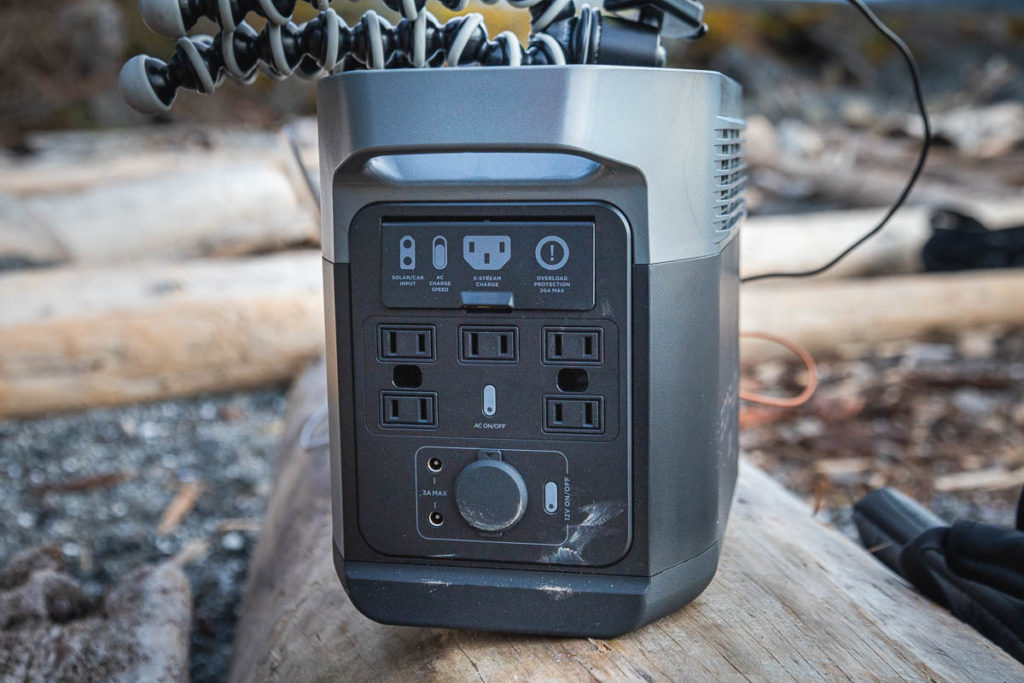
For the AC outlets, it’s nice to have 5. They are very close together so 5 large power bricks won’t fit together. Short extension cords would let you use all of them at the same time. I don’t think small power bars would break anything, to get more plugs, but don’t quote me on that. If you overload all the outlets with more than 1400 watts the battery just turns off.
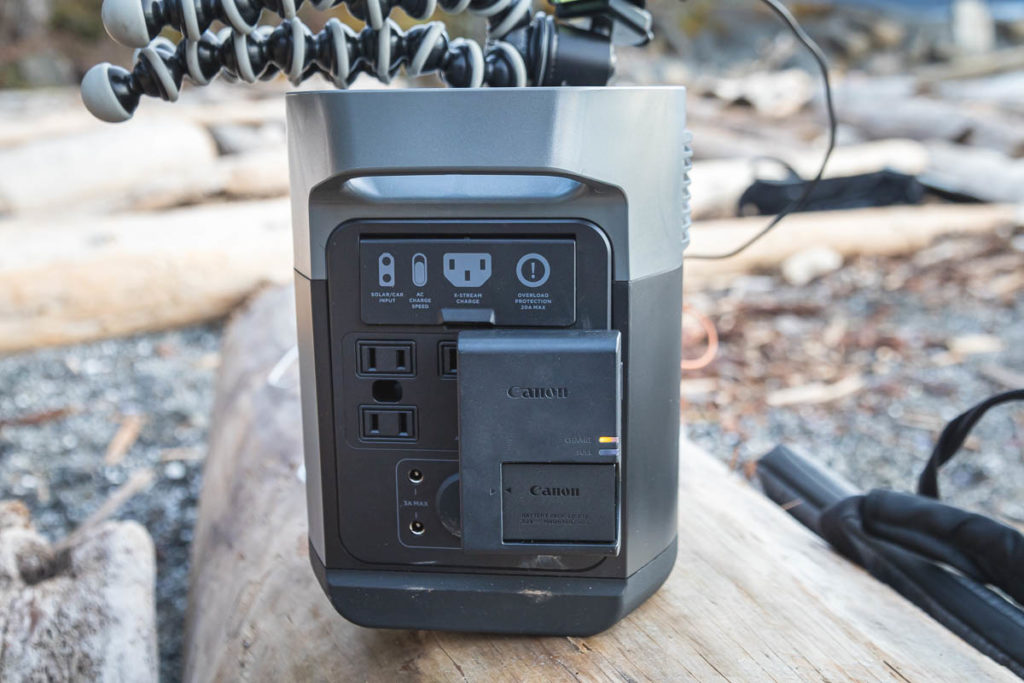
The 1400 watt output is great for lots of small devices or a couple larger ones. With a surge of 2100 watts it can handle larger items starting up.
It’s not going to run large heaters for long or at all but it can do small hair dryers and heaters. With the X-Boost mode on you can do larger items up to 1800 watts that don’t require strict voltage like heaters. EcoFlow recommends only using 1 outlet with X-Boost on. X-Boost is on automatically but can be disabled in the app.
For testing, I ran a 1675 watt hair dryer out of one of the AC outlets. It ran for a couple minutes with no problems. The battery stayed on the whole time. I was watching the app at the same time and it didn’t turn X-Boost on but I’m not sure if it shows in the app when it turns on automatically.
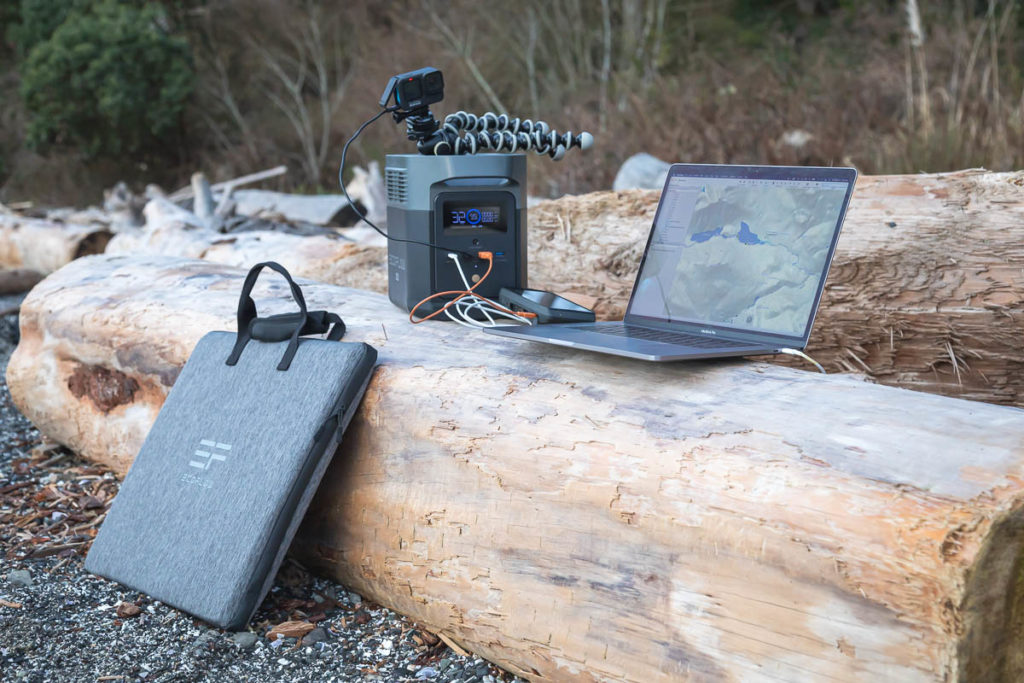
Screen
The screen on the Delta Mini is clear and easy to see.
It shows the battery level in a big ring in the center and the remaining charge time at your current draw on the left. On the right is input and output.
Along the top are some warning indicators that come on if it’s too hot or cold. Along the bottom it shows you the ports currently using power like the AC output or USB-C port.
The screen is very bright, a bit too much for a dark tent, but you can reduce the screen timeout down to 10 seconds from the default 5 minutes if you want.
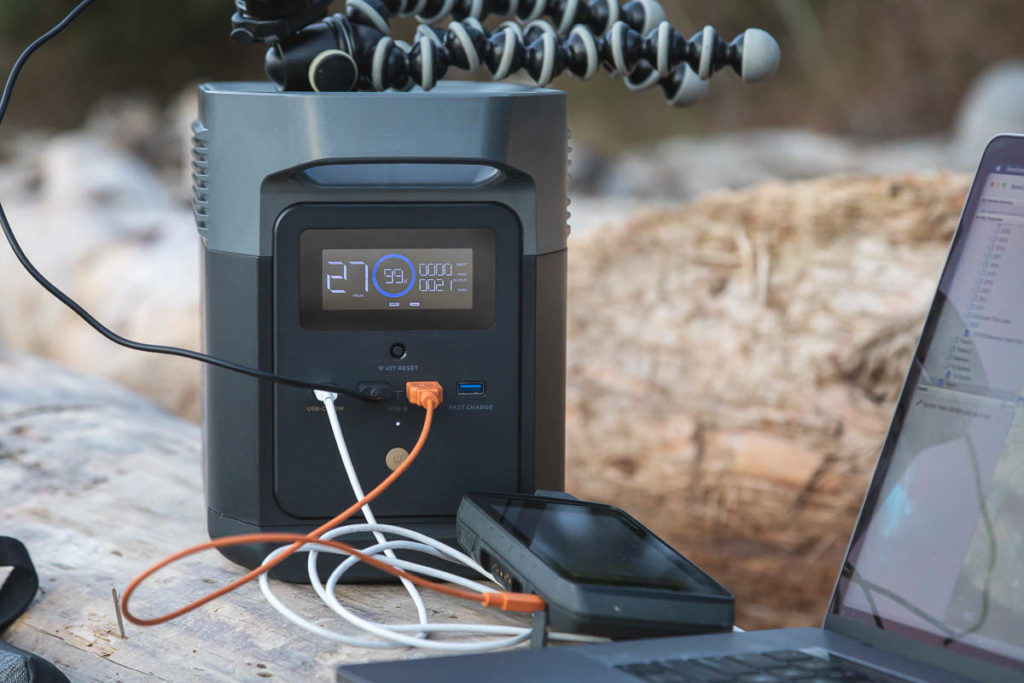
Charging
With the Delta mini we have 3 different options for charging:
- AC input port (900 watts max with X-Stream enabled) – 1.6 hours with X-Stream on
- Solar Input (300 watts 11-75V DC 10A max) – 4-7 hours with 2x 160 watt panels
- Car charger input (12V/24V DC 8A) – 9.5 hours
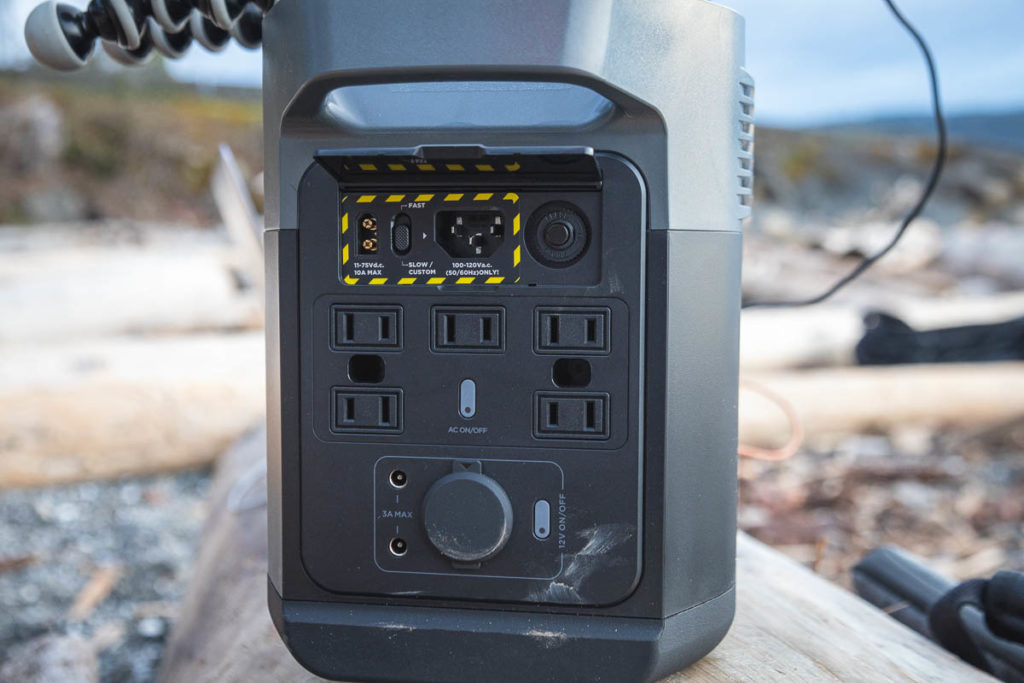
Car port charging
Not much to say about the car port charging. It comes with the car charging cable as many power stations don’t include it. It’s about 9.5 hours to charge fully in the car.
Solar Charging
The solar charging cable is an MC4 on the solar panel end and I’m still trying to find the exact specs of the battery end of the cable. The solar panel cable just connects straight to any solar panel with the positive and negative cables of an MC4 plug and then plugs into the battery.
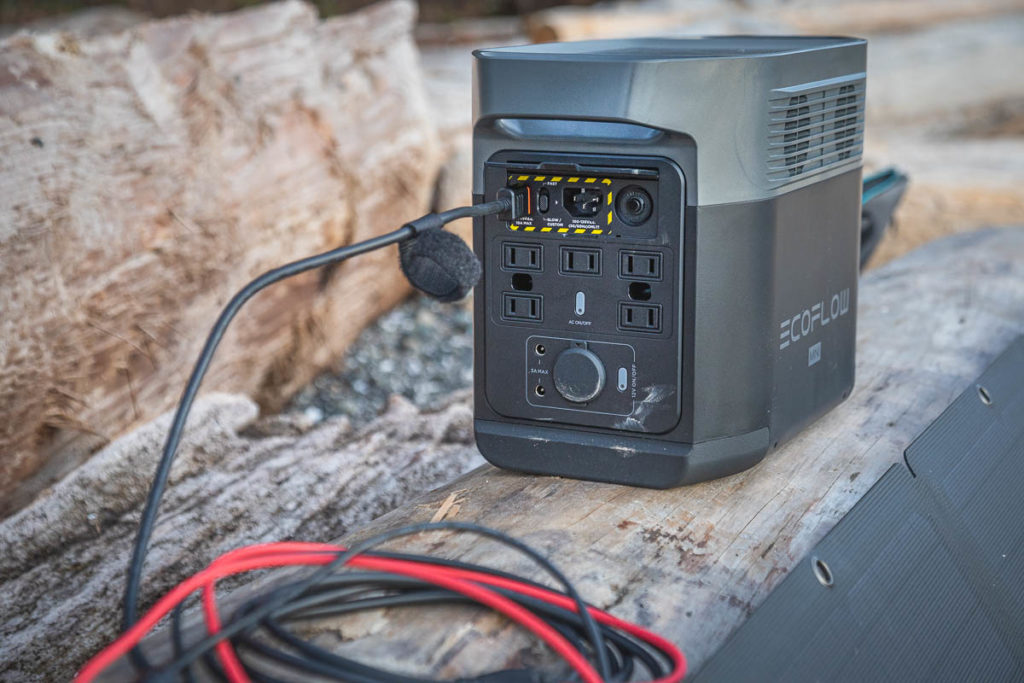
The solar charging is capped at 300 watts from solar panels. You can use 2 160 watt panels or 1 400 watt panel. I didn’t have a 400 watt panel to test with but the specs say it’s slightly faster to charge from a single 400 watt panel. 3.75 – 7.5 hours with 2 160 watt panels or 3-6 hours using 1 400 watt panels.
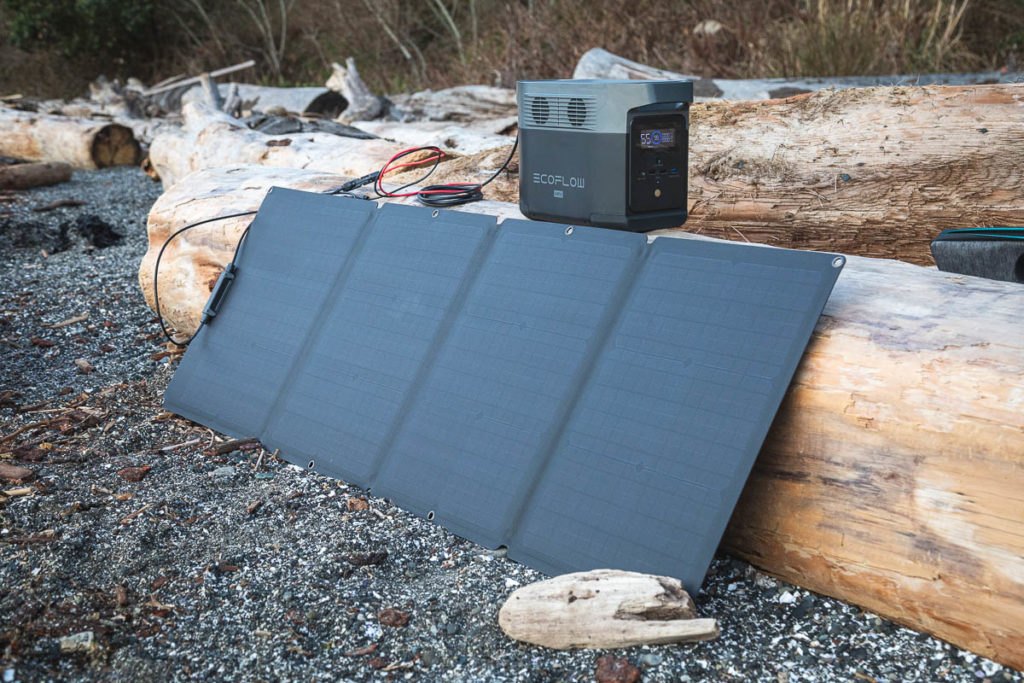
AC charging
The AC charging is where the Delta Mini is more impressive than any other battery I’ve tested.
With the the X-Stream option turned on, that fast charges the battery. That means 96 minutes from 0 to 100% of 882 watts. That’s 900 watts input. Crazy fast for charging.
The faster you charge a battery, the more it wears it down. I wouldn’t want to use the X-Stream option all the time but it’s a really nice feature to have in emergencies or you just need to top up the battery before leaving on a trip. I will be charging at normal speeds as much as possible.
One last note on the charging is that it can keep a charge for over a year. I haven’t had an entire year of the battery sitting to test this but it’s nice to know that even if we forget to the top it up, there should still be some charge there if we need the battery in 6 months.
EcoFlow App
EcoFlow has an iPhone and Android app to help control the batteries. You can connect with wifi if you’re at home or wifi directly to the battery if you’re out of the house, like the campsite.
The app lets you control multiple batteries if you have them and shows temperature, total percent remaining and estimated time left. It also shows total watts coming in and going out. You can enable and disable the AC and DC ports as well as X-Boost on the AC ports.
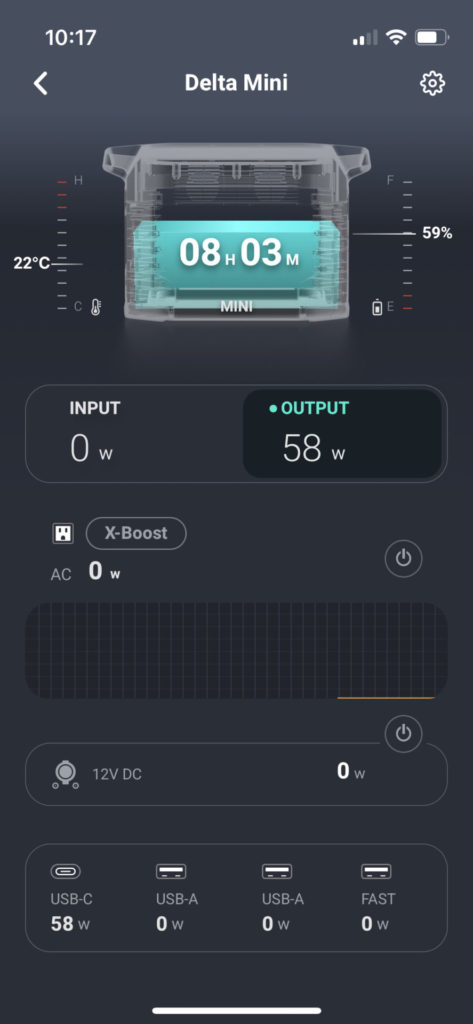
In the options menu, you can adjust the min and max charge levels, the AC charge speed between 300W and 900W, the car input amperage between 4, 6 and 8 and if the unit beeps when you press a button. The beep is good feedback when it’s across the house somewhere, but I prefer it silent.
You can also set the idle timeout for the whole unit, AC outlets and just the screen. Lastly it lets you update the firmware through the app with one click. I updated the firmware from 0.1.0.0 to 0.4.2.3. I haven’t been able to find the notes on the features in the firmware versions but it’s working wells so far.
Connecting using wifi was really quick. I added the Mini in the app and it asked me to hold the IoT button on the device. It directed me to connect directly to the battery using wifi and then go back to the app. After putting in my wifi username and password it was connected.
When connecting, you get the choice to connect the battery to the wifi or a ‘no internet’ option where the phone just stays connected straight to the battery. This is good for a campsite but requires the phone to stay on the battery wifi the whole time. The app supports bluetooth connection but unfortunately there is no bluetooth to connect on the the Delta Mini.
In the house as long as the battery is in the house it stays connected to the wifi, I can just hop on the app any time to check the battery status.
For charging small devices just checking the screen isn’t a problem. I do really like smart home devices that I can control from a distance. I was surprised to see that the app let me connect when my phone wasn’t on the same network as the battery. Out of the house on the cell network I could still open the app and see the battery and it’s current stats.
I can see the app being useful if something critical was plugged in there and you had to keep checking how much battery was left. Most of the time, I just check the screen when plugging in devices.
Unlinking a battery from the app is easy with a button in settings.
Alternatives
EcoFlow has a couple alternatives that are close to the Delta Mini. The Delta is the same style but a bit larger. The River Pro is the largest and most capable of the slightly smaller River line.
| Delta Mini | Delta | River Pro | ||
| Capacity | 882 Wh | 1260 Wh | 720 Wh | |
| Output | 1400W | 1800W | 600W | |
| Output with X-Boost | 1800W | 1800W | ||
| Max Surge | 2100W | 3300W | 1200W | |
| Max AC input | 900W | 1200W | 660W | |
| Max Solar input | 300W | 400W | 200W | |
| Lifespan | 800 cycles to 80% | 800 cycles to 80% | 800 cycles to 80% | |
| Weight | 24 pounds | 30 pounds | 15.9 pounds | |
| Price | $1299 CAD | $1899 CAD | $849 CAD |
Above the Mini, the Delta gets a capacity increase to 1260 Wh and with that output, surge, and AC and solar input increase. It also goes up a bit in weight and price. 30 pounds is still portable but does make it a bit more to carry around.
The River Pro on the lower side is smaller, lighter and less expensive but has lower outputs and capacity as well.
Both the Delta and the River Pro are excellent units but just different specs than the Delta Mini.
Conclusion
Verdict: Highly Recommended
Rating: 9/10
The EcoFlow Delta Mini portable power station is an excellent power station offering the features and output power of its bigger siblings in the Delta series but the portability similar to the smaller River series. Having 882 Wh of power to use up to 1400 watts (or 1800 with X-Boost) can power large devices around the house or the campsite. Many power stations pack a ton of power but can only charge small devices.
The 900 watt AC to charge the batter in less than 1.5 hours is very impressive. I don’t like to run this all the time but in an emergency or when you’re tight on time, charging this fast is so helpful. I don’t know of any other power stations that charge this fast aside from the other EcoFlow Delta
At just 24 pounds it’s easy to carry around the house or the campsite. I don’t use extension cords any more if it’s just a temporary job around the house. I just use the EcoFlow Mini.
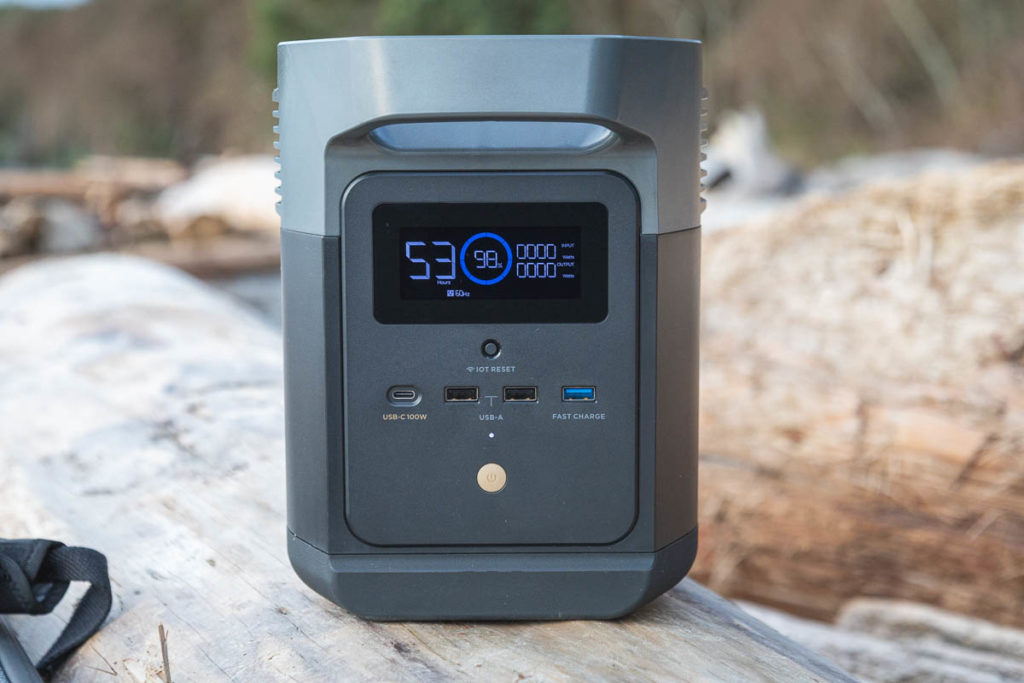
Just ordered one for an emergency back up to my gas generator, to run my full size refrigerator for a few hrs …..in a power outage ….great little unit
I just ordered the Delta Mini to add to my arsenal of Ecoflow River pro’s as I live in my minivan and travel. This mini should run my small fridge and a small freezer. The River pro’s will take care of everything else and all get charged by my propane generator. Loving my setup.
Lack of Bluetooth on the Delta Mini is a bit disappointing & the WiFi is clunky at best.